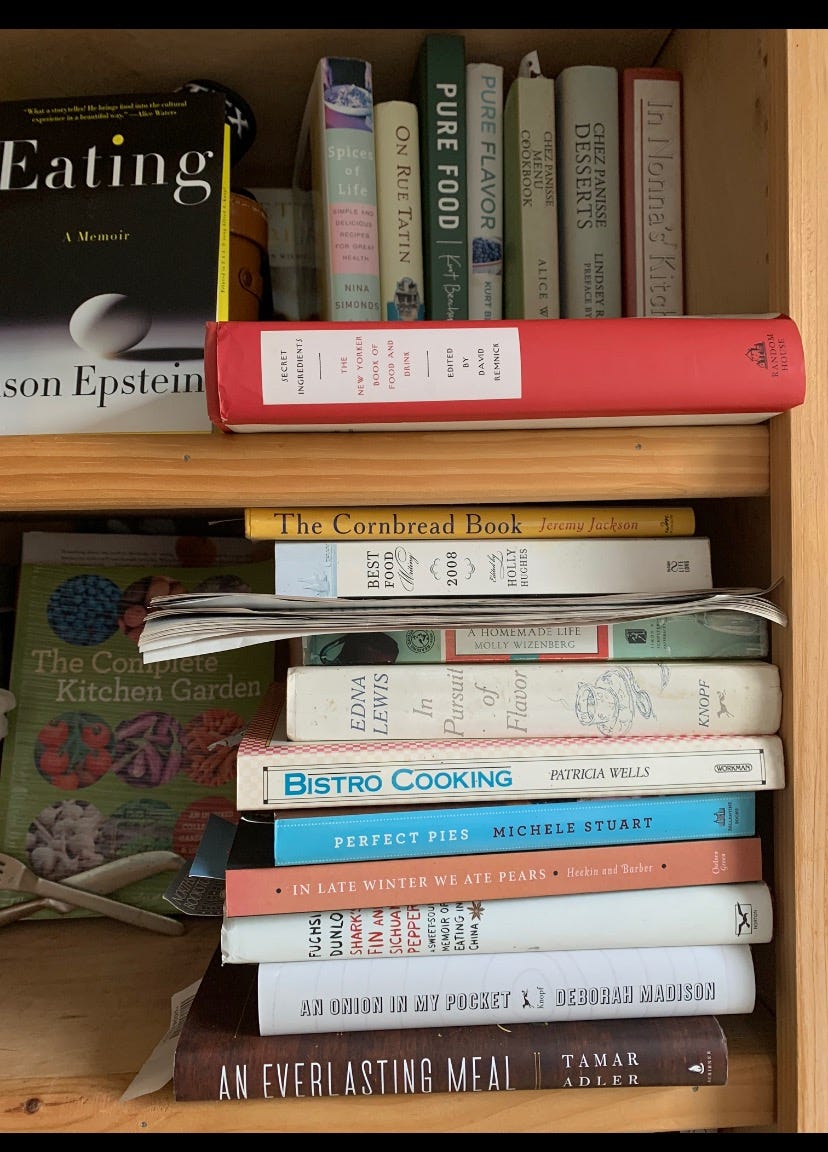“It takes two people to write a recipe; one who knows a lot and one who knows nothing.” - Marion Cunningham, Cookbook Author
Hello Everyone.
On the shelf with Mom’s cookbooks, I discovered a folder marked “recipes to try” that included clippings from newspapers and magazines throughout her lifetime. Oddly, none resonated with what I might like to cook, yet I kept them just in case. In another handwritten book, I found recipes that were ones that we cooked together: watermelon pickles, fruitcake, and an old-fashioned jelly roll. Seeing her handwriting and the food-spattered pages brought back memories.
I teach a class called How to Write a Family Cookbook because I am a bit obsessed with cookbooks. One of the most frequent questions I am asked is what constitutes an original recipe. This is a tricky question since most recipes are often a compilation of a classic. It all starts with a cookbook, and then we give it a new spin to make it unique. Keeping track of the original can be a little tricky.
Recipes are like saving heirloom seeds. At the end of the growing season, the seed is saved and then passed along from one generation to the next. Sometimes the original seed is renamed such as “Grandpa Ott’s Morning Glory” or “Aunt Molly’s Cape Gooseberry.” And that is when the true origin gets a little fuzzy.
When recipes are shared, they often become the domain of the cook, rather than from a cookbook. I advise my students to give credit, where credit is due. The best cookbook writers work hard to write a recipe and it requires time to explain in a way that allows the recipes to work — every time.
My process for writing a cookbook starts with a trove of recipes, written in a notebook, or on scraps of paper. Most can hardly be called recipes, as they are little more than a list of ingredients until I sit down to add instructions. A recipe is a formula, and it helps to read cookbooks like novels to absorb information for a foundation of knowledge.
There is no such thing as an original recipe because just like any art form, it is about borrowing ideas and making them our own. Practice is what makes cooking perfect, and it all starts with a cookbook written by someone who is an expert in their field.
The first recipe I made was Anadama bread from the Better Homes and Gardens bread cookbook. My mother placed a cookbook in front of me and said “Try it.” I was a grumpy teenager, yet after gathering the ingredients, and watching the yeast bubble I lost myself in the alchemy of taking raw ingredients: flour, water, and yeast and transforming them into delicious, aromatic bread. It was a pivotal moment and my first step to a lifelong passion.
In my cookbook writing class, I encourage students to gather their recipes, but then immerse themselves in all things food: listen to food podcasts, read food literature, and write food narratives that capture the moments in the kitchen that are triggered by the process. Above all read cookbooks.
In this digital age, cookbooks are more important than ever for capturing the spirit of sharing and caring in that magic that happens around the table. Cooking is far more than simply following a recipe, just as a kitchen garden is more than growing food. It involves active participation and turning work into play. A true cookbook is storytelling at it’s best.
Here are some tips for writing a recipe:
Writing a proper recipe starts with a snappy title, something that reflects an ingredient that may be unusual, and that gives the reader the spark to want to learn more.
Tell a short story in your headnote, about how the recipe evolved and perhaps even what it pairs with in a menu.
List ingredients in the order they appear in the instructions and add details for steps that can be done ahead of time.
Recipe writing takes time, far more time than one can imagine until you start writing down your recipes. Try your hand at writing out a few to share this holiday season, and maybe even gathering a few to add to your recipe collection. It’s never just about the recipes, but about connecting through the food, and capturing those moments is what the holidays are all about.
From my kitchen to yours,
Ellen O.
Ellen Ecker Ogden is a food and garden writer who lives in Vermont. She is the author of five books on cooking and kitchen garden design, including The New Heirloom Garden published in 2022. You can find her on Instagram.







Thank you, Mark! I enjoy your writing, and the photography is gorgeous.
I love that line about a recipe being like an heirloom seed - vey true